- Home
- John Ellsworth
Attorney at Large (Thaddeus Murfee Legal Thriller Series Book 3) Page 2
Attorney at Large (Thaddeus Murfee Legal Thriller Series Book 3) Read online
Page 2
Result: he earned over ten million dollars in legal fees. Not bad, your second year in practice.
But then things headed south.
He had crossed the Chicago mob and they sent men after him. They wanted him dead.
Fair enough, he understood where their heads were at and he really couldn’t blame them. He had messed up their ability to print dollars by illegal gambling, loan-sharking, prostitution, and drug dealing. He had lit them up with the spotlight of public clamor.
He got that.
But what they didn’t expect was that he would fight back.
How did he fight?
With the only tools a lawyer had: he sued them. The experts told him it couldn’t be done, that the mob couldn’t be sued. But he ignored them. He sued the mob and won.
The defendants were a godfather, Bang Bang Moltinari, and his consigliere, Lincoln Mascari.
Thaddeus must have done something right, because—long story short—he took away their casino. And he took a bunch of money from them. Money they had stashed in Swiss banks.
Now he owned the Desert Riviera Casino and Hotel in Las Vegas and he had millions in the bank.
After the casino case concluded, the FBI went after the godfather in its own conclusive way.
They had the Air Force fly a drone over the Don’s estate in Mexico where he was hiding out, and fired a Hellfire missile into his bedroom. End of godfather. Which, Thaddeus had to admit, helped him breathe a whole lot easier.
But there was one glaring problem left unsolved and that was Lincoln Mascari, who was still very alive and well. Mascari had stepped into Bang Bang’s shoes in Chicago.
The largest Chicago mob family now belonged to him.
3
Two weeks later, he was back in Chicago, trying a medical malpractice case for the death of a newborn. He and Albert represented the parents.
The long courtroom windows admitted early evening dark and the glow of Chicago street lights when closing arguments finally got underway.
The jury was exhausted but excited to hear the lawyers’ summations. Before long they would be free to return to their families and normal lives.
Thaddeus wet his lips and swallowed hard. A final sip of water and he crossed from counsel table to the podium.
“Let me thank you for your jury service,” he began, and he stepped from behind the podium and up to the jury. He wanted them close, wanted to see their faces, wanted them to see the pain in his eyes, the pain he felt for the dead baby.
Thaddeus was lithe and lean, wore round eyeglasses below the bowl cut of his hair, and that day was dressed in pinstripes and wing-tips—Chicago court haberdashery.
He moved with the athletic step of a college point guard as he made his way along the jury box.
At his collar his hair was just an inch too long for someone trying cases in front of juries, at least according to how old-school Chicago did things.
His face was what some would call “attractive” and others would call “brotherly.” But his eyes were an icy blue that pierced and probed at witnesses, lawyers, jurors, judges, and the rest of the world.
Right then they were focused only on the jury. Eye contact bound everyone together as they tried to unravel the mystery of the baby’s death. Was it medical malpractice or was the mother’s lack of prenatal doctor visits what killed the baby Kim Ehlers? Soon, the jury would be making that decision. For right now, Thaddeus was doing everything in his power to guide them along the path to making what he wanted them to believe was the only correct decision.
He began slowly.
“Now, Doctor Jordan is a heck of a nice man. We can all agree on that at least. He is the father of seven children and the grandpa to eleven grandchildren. He is a member of the Moose, the Elks, and the VFW. Vietnam 1968-1969. He worked at delivering babies for twenty-eight years before taking medical retirement.”
He looked the jury up and down, and nodded. “But Doc Jordan was a huge drinker—by his own admission. Remember Father Conroy’s testimony? Doc Jordan told Father that he’d flunked out of AA no less than seven times. That he even remembered. And look at this”—holding up exhibit 67—“It’s in the admitting hospital’s own investigation report that Doc Jordan had ingested a fifth of vodka in the twelve hours before he entered the hospital to deliver little Kim Ehlers. Of course Doctor Jordan’s wife, Cindy, claims she never told that to the investigator. Still, it’s in the hospital’s own records! How else did it get there if she didn’t tell them?” His piercing eyes addressed the jury and he let it sink in.
“By the way,” he began again, “how many drinks would that be, for those of you unfamiliar with the ingestion of large quantities of liquor? Well, let’s see what the doc’s wife said Doc had in the previous twelve hours.”
Thaddeus cut to the whiteboard and wrote: “1 Fifth of Whiskey = 1/5 Gallon.”
Then he turned to face the jury.
“A gallon has one hundred twenty-eight fluid ounces, so one-fifth of that is twenty-five point six ounces, which tells us there are twenty-five point six ounces in your fifth of whiskey. The standard shot glass is one point five ounces, so the fifth contains about seventeen shots. Which means Doc Jordan had about seventeen drinks or one-fifth of a gallon of vodka in the twelve hours before he arrived at Hudd Family Hospital. And one-fifth is how much Cindy told hospital investigators that Sam had to drink over the last hours before he went into that delivery room. She also told the investigators that she found the empty fifth in the kitchen trash and that she knew it was from that day because the fifth that Doc always kept in the freezer was missing.”
Thaddeus returned to the podium and pretended to study his notes while he let the math and admissions sink in. Then he returned to his place before the jury.
“Here’s another way of looking at it. If your car gets fifteen miles to the gallon and you poured Doc’s fifth of vodka in the tank you could drive three miles on how much Doc Jordan had to drink.”
The jurors looked at Doctor Jordan to see how he was taking this.
He was a gray-skinned man in his early sixties who looked middle seventies. It had been a hard life for Doctor Jordan, spending his best years with the bottle. His pallor and slump said it all.
He grimaced at Thaddeus’ words. Another deep cut. A look of predictable guilt settled over his face.
The jurors looked away.
Thaddeus continued. “So when the baby girl Kim’s fragile brain had its blood flow cut off by the twisted umbilical, she didn’t have a sober doctor to rely on to save her life. Was that the baby’s fault? Well, according to counsel”—he paused long enough to point at defense counsel—“according to counsel, the baby’s prenatal vitamins and the mother’s lack of prenatal examinations should be blamed for everything that went wrong that Christmas Eve. He wants you to forget Doctor Jordan’s two solid days of drinking and look only at baby Kim and her mother. But here’s what I need you to remember when you retire to deliberate....”
* * *
An hour passed, by the clock on the wall.
Soundlessly, as a ghostly apparition, the jury returned and assembled in the jury box.
All were standing, looking away from the doctor. His eyes retreated to the table top. He had seen all he needed to know.
Judge Brown said the magic words, spoken daily in courtrooms across America, “Has the jury reached a verdict?”
The jury foreman answered, “We have, Your Honor.”
“Please read your verdict aloud.”
The foreman pressed his half-shell glasses to the bridge of his nose and cleared his throat. It had been a long two weeks but there had been little bickering. The jury was of one mind. He read, “We the jury do find for the plaintiffs and against the defendants.”
Thaddeus and the baby’s parents stood up from their table like the phoenix from a very hot fire.
They had survived!
There was barely suppressed elation as they struggled to control their joy at having b
eaten the wealthy doctor-hospital syndicate.
They pumped hands all around and there were whispered thank-yous passed along to Thaddeus. They broke off in small groups and began packing briefcases and laptops.
The jury foreman approached Thaddeus and tapped his shoulder. “I think I remember you.”
Thaddeus turned from his briefcase and faced the foreman. He smiled down at the man, who was much smaller than he looked just an hour ago in the jury box. “How’s that?”
“Yes, I’m sure of it now. You were Georgetown’s shooting guard, took them to the Sweet Sixteen. You guys would’ve won the whole thing if Drummond hadn’t fouled out.”
“That was eight years ago. You have a good memory. Thanks for your jury service. You’ve all done the right thing here today.”
“You’re the lawyer who sued the mob and took a casino away from them.”
Thaddeus turned back. “You know about that?”
“Everyone on the jury knew about that. We discussed it.”
Thaddeus shook his head, a wan smile on his face. “Well, that’s why we have trials. You never know what a jury will do—or talk about.”
Albert Hightower was exhausted from the two-week trial. But he was ready to fly Thaddeus back out to Las Vegas. He touched Thaddeus’ elbow and moved him away from the juror.
Albert said, “You up for this?”
“Flying out to Vegas? Are you?”
“Let me grab a steak and a pot of coffee and I’m as good as new.”
“What if we eat on the plane?”
They were flying the new Learjet 85 and would call the cabin attendants with food orders before they left the courthouse. Chicago’s Midway Airport was a half hour away and the general aviation terminal would be cleared out by the time they arrived. The plane belonged to the law firm so there was no schedule to meet, no deadlines, just a great weekend opening up for the lawyers. Albert would captain the flight. Co-pilot Bill Burrell would fly the right-hand seat. Thaddeus would sleep most of the way.
“I’ll call in the orders. You want a steak too?” Albert asked.
Thaddeus stopped dumping files into his briefcase. “Two enchiladas and a green chili relleno. Con arrozo y frijoles.”
“Done.”
They would be airborne in less than an hour, shoes off, ties loosened, full bellies.
The jury had returned a six-million-dollar judgment. The lawyers had just earned two million dollars in legal fees, and they would be getting repaid their $150,000 in costs.
The parents would receive four million dollars for the untimely and horrendous death of their angel. It was never enough, it solved nothing, but it made a statement. The statement said the parents could sleep tonight, knowing that the doctor, not they, bore responsibility for the tragedy.
They thanked Thaddeus and hugged him and Albert again for the verdict and left the courtroom.
Thaddeus and Albert followed close behind, watching the clients disappear inside the elevator.
They knew that for those parents it would be a quiet ride back to their empty house.
He shuddered at their loss, which Thaddeus still felt clear down into the pit of his stomach.
Then it was time to move on, time to prepare for the next courthouse war.
But first he would look in on the casino.
Slowly—so slowly—they were coming on-line with better casino management, better security, and better staff all around as Thaddeus grew more intimately acquainted with his acquisition.
Still, the whole business was like a beast that was eating away at more and more of his time. He was beginning to have serious second doubts about his decision to keep it and run it himself.
He had hired Mickey Herkemier and placed Mickey between himself and the casino as the general manager and CEO, but enough problems still found their way through the wall he had tried to erect. Thaddeus reminded himself of what Truman had said: The buck stops here.
The taxi took them to Midway Airport, where they hurried through the general terminal, stepped outside into the early evening air, and clambered aboard the waiting jet.
4
Ragman was demanding $1 million cash up front
Lincoln Mascari pulled out all the stops to get it for him. From his office in Skokie he demanded his troops take down banks and double-up the narcotics traffic.
They hit the First State Bank of Arlington Heights and brought in $85,000 cash, with change.
The Greenville Farmers Trust in Greenville was next; it netted them $55,000 on a Friday when soybeans were being sold and money deposited by the farmers.
Hunnicutt Mutual Savings and Loan in Joliet coughed up $125,000 and its branch in Forest Heights added another $35,000.
Narcotics sales skyrocketed.
In three short weeks the cash was assembled and placed in a black valise on Mascari’s ancient oak desk in the refurbished lube joint.
“I need you to chain this to your wrist and fly it over to LA,” Mascari told Zann Roget, his long-time hussy and mother of two of his kids. “Guy’s name is Ragman and he’ll be waving a sign at LAX says ‘Salvation Army.’”
“That’s it? Just ‘Salvation Army’?”
Mascari shrugged. “I know. It ain’t much to go on, but that’s how he wants to play. Now get outta here.”
So Zann flew to LAX on a rainy Thursday morning, white-knuckled as they rose up through the clouds, and then relaxing when they topped out, the sunshine blazing down. Soon, the Scotch wagon clattered up the aisle.
She was half in the bag by the time they touched down in LA., with the valise chained to her wrist.
The key had been FedEx’d to Ragman, care of a Mailbox USA.
Walking tipsily up the jetway, she located the sign and saw the small, nondescript man holding it. He was wearing a relaxed-fit business suit and a red carnation in his lapel. “Hold still,” he told her. He inserted the key.
Two seconds later she was free of the bag and he was gone with the outgoing crowd.
She waited three hours for her return flight and drank coffee the whole time. At 4:05 they took off, her with a headache, the 777 with a tailwind.
5
She had graduated from UCLA, turned down several guys who wanted to settle down and make babies with her, and headed to Las Vegas to count cards.
The first couple months she had spent practicing her blackjack in the off-Strip casinos where nobody noticed her.
She soon graduated to the super casinos along the Strip, where she began to turn heads.
Slowly at first they began watching her, then she became a suspect, one who was probably counting cards.
So she had to refine her game, become less noticeable. She learned she had to suffer some losses in order to make them believe she was just an amateur who happened to be having a lucky streak. So she lost a few bets every night, here and there. Then when the deck shifted in her favor she would hit it big, scoop up her winnings, and move the party to the next casino on the Strip.
Before long she was earning $1,000 each time she went into a casino. It became easy to win and she was loving her life.
Then came the attack and everything changed.
The night of the attack, Thaddeus had been back in Las Vegas one day following the Kim Ehlers baby trial.
On returning to the casino he had shut the door to his office and begun learning everything he could about the casino on paper.
He had examined the books, studied the management records with Mickey Herkemier, studied staffing requirements and available staff, discussed security with the chief of security. On the second night back, he was going to take time to snoop around the floor of the casino. He believed in hands-on management and he believed that studying the players and the dealers was the best way to spend some time when all else was put to bed.
He noticed her right away.
There was something familiar but fleeting about her.
Maybe it was her hair, he guessed, or how she carried herself.
&nb
sp; She was facing away, studying the blackjack tables, and he was unable to get a good look. But he stood by and watched. Something had made him look at her a second time.
Kiki Murphy was four months in Las Vegas when she walked into the Desert Riviera that Thursday night. She was alone coming in and she planned to be alone going out. She was attractive in a TV personality kind of way, well-muscled arms and legs, spray-on tan, looking like maybe she had at one time been a gymnast but gave that up when she grew six inches too tall.
Her healthy looks and blond wedge haircut would have easily landed her a job as a First Report news anchor, but that wasn’t her. She was trying to remain anonymous on the Strip.
Her outfit was extremely ambiguous: khaki slacks, navy golf shirt with the Polo pony, ankle boots, sorority necklace and eyeliner only.
This was her fourth night in a row working the tables, where she was winning her $3,500 mortgage payment, due in two days.
The Desert Riviera staffers wouldn’t know it until later, but Kiki was also packing heat.
Hidden in her Coach bag was a nickel-plated S&W .38 snub-nose.
She had zero intention of pointing it at anybody, much less shooting anyone—it was all about self-defense. There was just too much money flooding through the casinos. Sooner or later someone would see her win big, see that she was alone, and rob her.
So she bought the gun.
A purse model.
Like all gamblers, she was hedging her bets.
It just so happened Thaddeus was snooping the high-stakes tables when Kiki came through the rope.
He watched as she marched up to the blackjack dealer and plopped down $900 in black chips.
He watched the interplay between Kiki and the dealer.
She was adorable and Thaddeus could see the dealer almost smile. He guessed the dealer probably gave himself ten hands to clean her out. You could just see it in his eyes—his tell, his giveaway.
From where he stood Thaddeus had a pretty good view of four blackjack tables. He was looking for card counters. She was playing at the blackjack table closest to his left, table 11 (there was no table 13—gamblers know all casinos number their tables. They would never wager a bet at a table number 13).

 Girl, Under Oath (Michael Gresham Series)
Girl, Under Oath (Michael Gresham Series)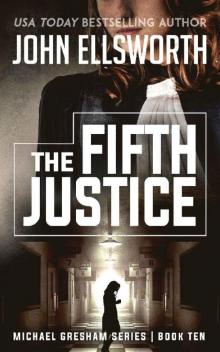 The Fifth Justice (Michael Gresham Legal Thrillers Book 10)
The Fifth Justice (Michael Gresham Legal Thrillers Book 10)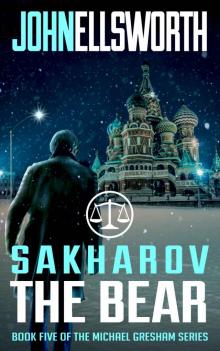 Michael Gresham (Book 5): Sakharov the Bear
Michael Gresham (Book 5): Sakharov the Bear Voices In The Walls: A Psychological Thriller (Michael Gresham Series)
Voices In The Walls: A Psychological Thriller (Michael Gresham Series)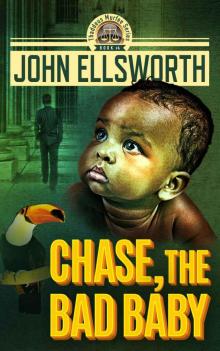 Chase, the Bad Baby: A Legal and Medical Thriller (Thaddeus Murfee Legal Thriller Series Book 4)
Chase, the Bad Baby: A Legal and Medical Thriller (Thaddeus Murfee Legal Thriller Series Book 4)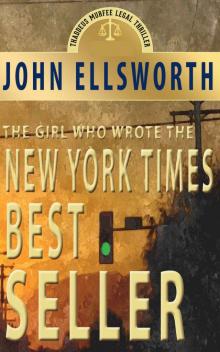 The Girl Who Wrote The New York Times Bestseller: A Novel (Thaddeus Murfee Legal Thrillers Book 8)
The Girl Who Wrote The New York Times Bestseller: A Novel (Thaddeus Murfee Legal Thrillers Book 8)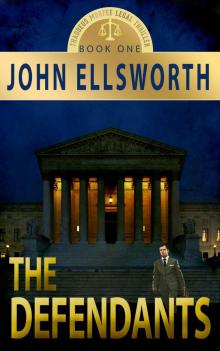 The Defendants: Crime Fiction & Legal Thriller (Thaddeus Murfee Legal Thriller Series Book 1)
The Defendants: Crime Fiction & Legal Thriller (Thaddeus Murfee Legal Thriller Series Book 1) Hellfire (Sisters In Law Book 2)
Hellfire (Sisters In Law Book 2)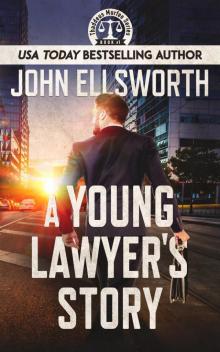 A Young Lawyer's story
A Young Lawyer's story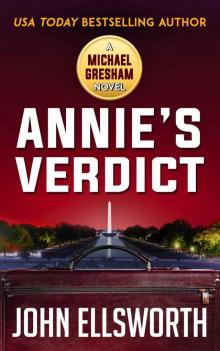 Annie's Verdict (Michael Gresham Legal Thrillers Book 6)
Annie's Verdict (Michael Gresham Legal Thrillers Book 6)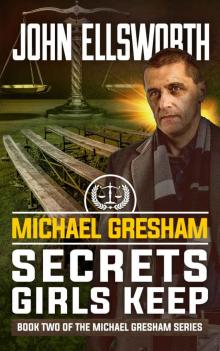 Legal Thriller: Michael Gresham: Secrets Girls Keep: A Courtroom Drama (Michael Gresham Legal Thriller Series Book 2)
Legal Thriller: Michael Gresham: Secrets Girls Keep: A Courtroom Drama (Michael Gresham Legal Thriller Series Book 2)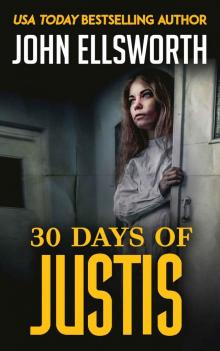 30 Days of Justis
30 Days of Justis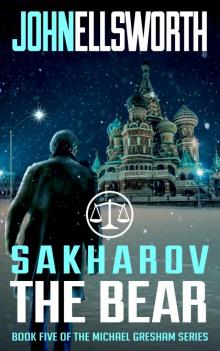 Sakharov the Bear (Michael Gresham Legal Thrillers Book 5)
Sakharov the Bear (Michael Gresham Legal Thrillers Book 5)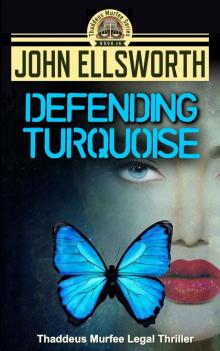 Defending Turquoise (Thaddeus Murfee Legal Thriller Series Book 5)
Defending Turquoise (Thaddeus Murfee Legal Thriller Series Book 5)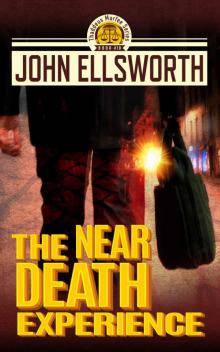 The Near Death Experience (Thaddeus Murfee Legal Thriller Series Book 10)
The Near Death Experience (Thaddeus Murfee Legal Thriller Series Book 10)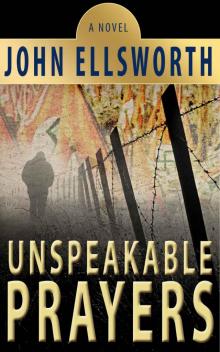 Unspeakable Prayers: WW II to Present Day (Thaddeus Murfee Series of Legal Thrillers)
Unspeakable Prayers: WW II to Present Day (Thaddeus Murfee Series of Legal Thrillers)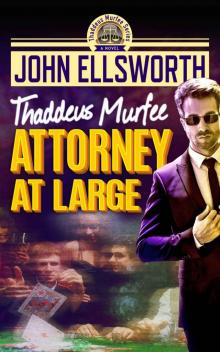 Attorney at Large (Thaddeus Murfee Legal Thriller Series Book 3)
Attorney at Large (Thaddeus Murfee Legal Thriller Series Book 3)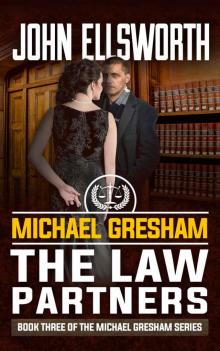 The Law Partners (Michael Gresham Legal Thriller Series Book 3)
The Law Partners (Michael Gresham Legal Thriller Series Book 3)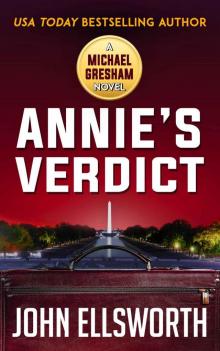 Annie's Verdict
Annie's Verdict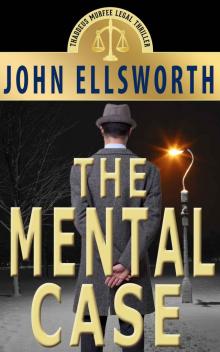 The Mental Case (Thaddeus Murfee Legal Thriller Series Book 6)
The Mental Case (Thaddeus Murfee Legal Thriller Series Book 6)